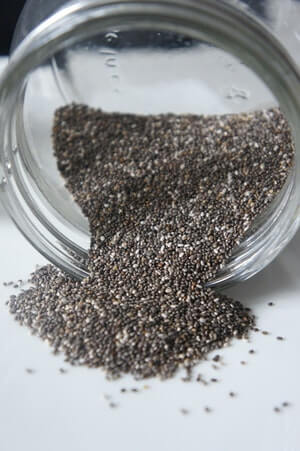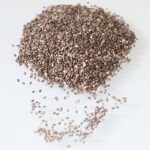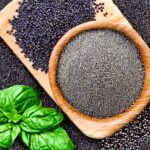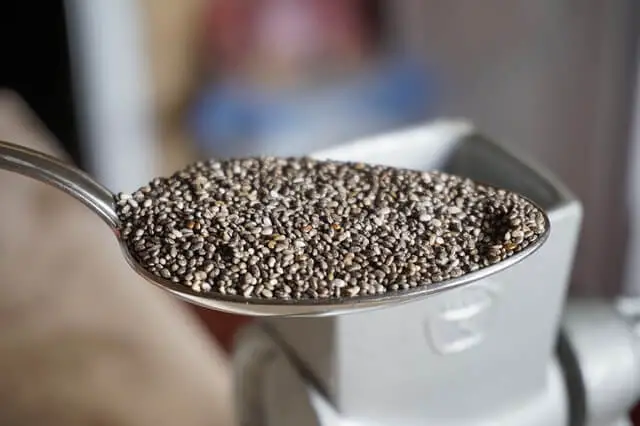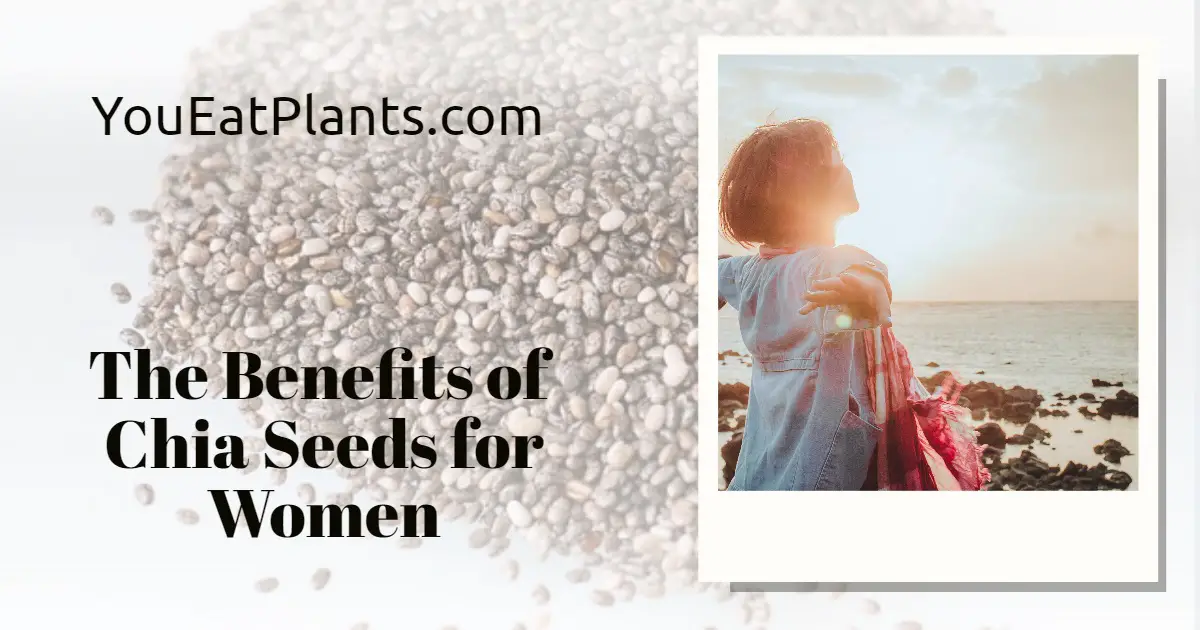
Chia seeds are small, nutty-flavored seeds that are packed with a variety of nutrients and are thought to have a number of potential health benefits. From weight management and heart health, to bone health and digestive health, chia seeds may offer a range of benefits for women.
In this article, we will explore the various potential health benefits of chia seeds for women and provide some ideas for incorporating them into your diet.
- What are Chia Seeds?
- Chia Seeds Benefits for Women
- Using Chia Seeds in Your Diet
- Chia Seeds Side Effects in Females
- Final Thoughts
What are Chia Seeds?
Chia seeds are small, oval-shaped seeds that are native to Mexico and Central America. They are a member of the mint family and are known for their high nutrient content, including fiber, protein, omega-3 fatty acids, antioxidants, and various vitamins and minerals.
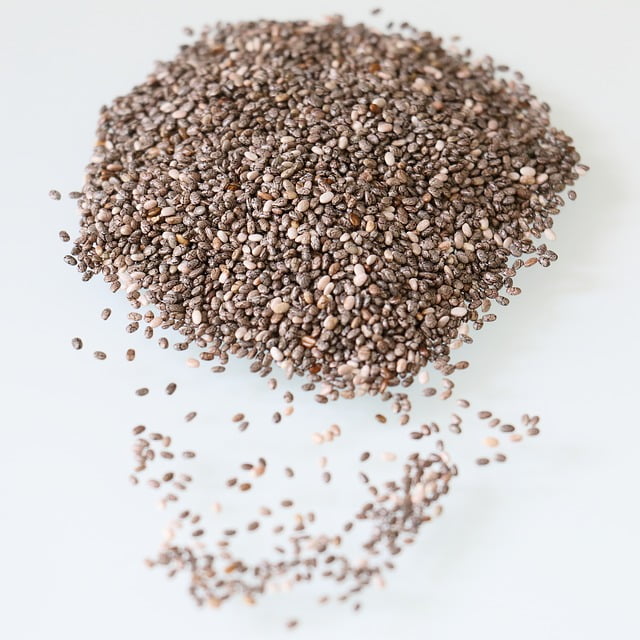
Chia seeds have a nutty flavor and can be easily incorporated into a variety of dishes, including oatmeal, smoothies, yogurt, and baked goods. They can also be consumed on their own as a snack, either dry or mixed with water to create a pudding-like consistency.
Although chia seeds are great, remember that including a variety of nutrients in a woman’s diet is also important for maintaining overall health and well-being. Different nutrients play different roles in the body and are necessary for proper function. Also, remember not to overconsume chia seeds and eat them only in moderation. (See Benefits and Side Effects of Chia Seeds)
A diet that is rich in a variety of nutrients can help to support various bodily systems and reduce the risk of certain health conditions.
Chia Seeds Benefits for Women
Chia seeds are small, nutty-flavored seeds that are packed with a variety of nutrients and are thought to have a number of potential health benefits. And you can easily start with just 1 tsp of chia seeds every day, and increase this amount as you feel comfortable.
Here is a closer look at some of the potential benefits of chia seeds for women:
Weight management
Chia seeds are high in fiber, which may help to support weight management by promoting feelings of fullness and helping to regulate appetite. In fact, one study found that people who consumed chia seeds as part of a weight loss diet lost significantly more weight and had greater reductions in waist circumference compared to those who did not consume chia seeds. Another study found that consuming chia seeds as part of a calorie-restricted diet led to significant reductions in body weight and body mass index (BMI).
Heart health
Chia seeds are high in heart-healthy omega-3 fatty acids, which may help to reduce inflammation and improve cholesterol levels. In fact, one study found that consuming chia seeds daily for 12 weeks led to significant reductions in total cholesterol, low-density lipoprotein (LDL) cholesterol, and triglycerides. Another study found that consuming chia seeds daily for 12 weeks led to significant reductions in blood pressure.
Bone health
Chia seeds are a good source of calcium, which is important for bone health. Adequate intake of calcium is especially important for women, as bone density tends to decrease as we age, increasing the risk of osteoporosis. One study found that postmenopausal women who consumed chia seeds daily for 12 weeks had significantly increased bone mineral density compared to those who did not consume chia seeds.
Digestive health
Chia seeds are high in soluble fiber, which may help to support digestive health by promoting the growth of good bacteria in the gut and helping to bulk up stools. Soluble fiber has also been shown to help reduce constipation and improve overall bowel function.
(Learn more at Chia Seeds Benefits for Stomach)
Energy and endurance
Chia seeds are a good source of energy and are thought to help improve endurance. They are high in protein and contain important electrolytes such as potassium and sodium, which may help to support athletic performance. In fact, one study found that consuming chia seeds as part of a pre-exercise meal improved exercise performance in endurance athletes.
Nutrients
In addition to these potential health benefits, chia seeds are also a good source of various nutrients, including vitamin K, vitamin C, and folate. They are also a good source of antioxidants, which are compounds that help to protect the body against damage from harmful substances called free radicals.
Some studies have suggested that a diet rich in antioxidants may have a number of potential health benefits, including reducing the risk of certain chronic diseases such as cancer and heart disease.
Skin health
Chia seeds can also provide benefits for the skin. This is because they are a good source of Omega-3s, which help to moisturize skin.
And, they provide antioxidants that fight skin-damaging free radicals and minerals that help to promote skin development and growth. (See Benefits of Chia Seeds for Skin)
It is important to note that more research is needed to fully understand the potential health benefits of chia seeds for women. As with any dietary supplement, it is always a good idea to speak with a healthcare provider or registered dietitian before adding chia seeds to your diet.
Using Chia Seeds in Your Diet
There are many ways to incorporate chia seeds into your diet. They can be easily added to a variety of dishes, such as oatmeal, smoothies, yogurt, and baked goods.
They can also be mixed with water to create a gel-like substance that can be used as an egg replacer in recipes or added to oatmeal. (See Benefits of Chia Seeds in Water) Chia seeds can also be consumed on their own as a snack, either dry or mixed with water to create a pudding-like consistency.
As mentioned earlier, you can start with as little as 1 teaspoon to 1 tablespoon per day, and increase this amount gradually. (Learn more at The Right Amount of Chia Seeds to Eat Per Day)
Chia Seeds Side Effects in Females
Chia seeds are generally considered to be safe for most people when consumed in moderation. However, like any food, they may cause some side effects in some individuals. Here are some potential side effects of chia seeds in women:
- Digestive issues: Some people may experience digestive issues such as bloating, gas, and diarrhea when consuming large amounts of chia seeds. This may be due to the high fiber content of chia seeds, which can be difficult for some people to digest. It is important to start with a small amount of chia seeds and gradually increase your intake to allow your body to get used to the fiber.
- Allergic reactions: Some people may be allergic to chia seeds and may experience allergic reactions such as hives, itching, swelling, and difficulty breathing. If you have a known allergy to chia seeds or any other food, it is important to avoid consuming them.
- Interactions with medications: Chia seeds may interact with certain medications, including blood thinners such as warfarin. They may also interfere with the absorption of certain medications. If you are taking any medications, it is important to speak with a healthcare provider or registered dietitian before adding chia seeds to your diet.
- Risk of choking: Chia seeds can absorb large amounts of water and expand, which may cause them to stick to the throat and cause choking. It is important to drink plenty of water when consuming chia seeds and to chew them well.
It is important to note that these side effects are rare and may not affect everyone. If you experience any side effects after consuming chia seeds, it is important to speak with a healthcare provider or registered dietitian. (Learn more at Side Effects of Chia Seeds in Females)
Final Thoughts
In conclusion, chia seeds are a nutrient-dense food that may have a number of potential health benefits for women, including weight management, heart health, bone health, digestive health, and improved energy and endurance. It is important to note that more research is needed to fully understand the potential health benefits of chia seeds for women.
Lance has been passionate about the plant-based diet and we have been following a whole food plant-based diet for over 5 years. We focus on health, natural healing, weight management, animal rights, and the health of the planet and environment by focusing on whole plant-based foods and sustainable practices.
Learn more at the About Me page and follow on social media at the links below.


